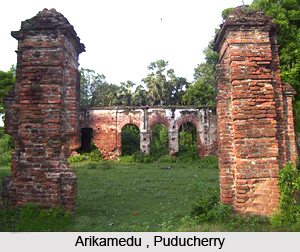 Less than 10 km from the town of Pondicherry is the famous and important archaeological site named Arikamedu. Arikamedu is the most extensive Indo-Roman trading station on the Coro-mandel Coast. The Romans called it Podouke. It is situated close to the spot where the river Ariyankuppam joins the Bay of Bengal.
Less than 10 km from the town of Pondicherry is the famous and important archaeological site named Arikamedu. Arikamedu is the most extensive Indo-Roman trading station on the Coro-mandel Coast. The Romans called it Podouke. It is situated close to the spot where the river Ariyankuppam joins the Bay of Bengal.
Arikamedu possesses an interesting past. Decades ago, a French scholar living in the area chanced to see a gem bearing a bust of Augustus, among the playthings of a group of local children. He immediately recognized the archaeological potential of the place and arranged for an excavation of the site. The digs revealed several Roman objects including the Roman amphora jars. Subsequently, many British, Indian and American archaeologists have excavated the site. The discoveries include a dyeing vat indicating that the site was a textile-manufacturing centre. The brick ruins of an ancient harbour are also seen here.
The Government Museum at Pondicherry displays most of the artifacts unearthed at Arikamedu. Besides, the museum also has objects pertaining to the French rule (18th to 20th centuries A.D.) in the area. These include French furniture and sculptures.
The museum also has a fine collection of Chola bronzes (10th-11th centuries A.D.), specially icons of Nataraja or the dancing Siva.






